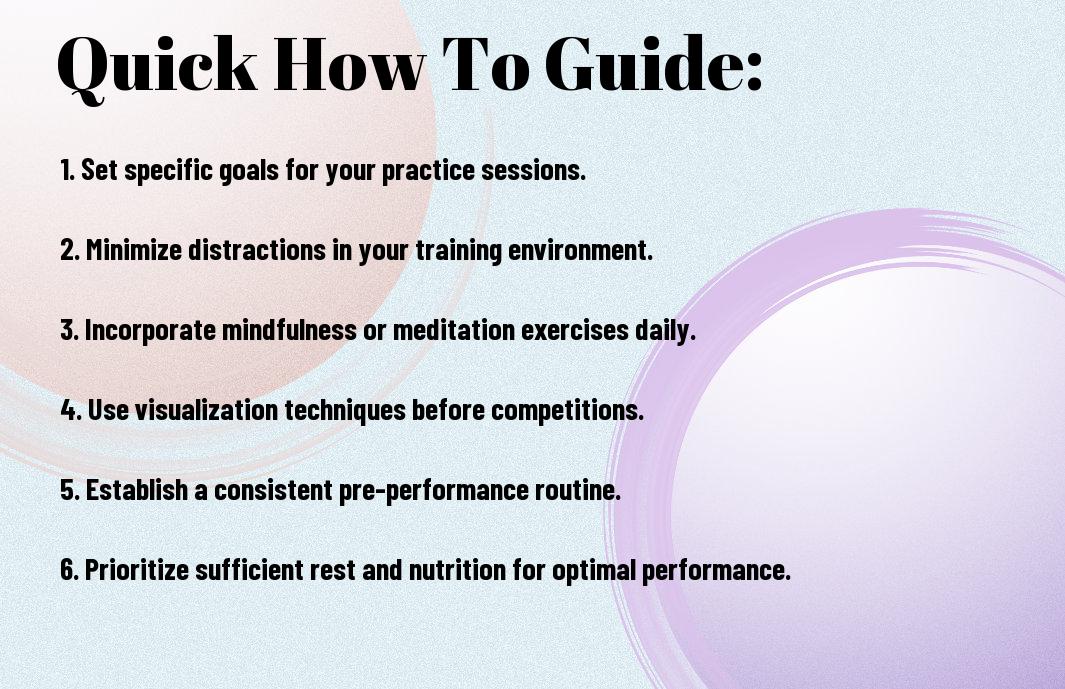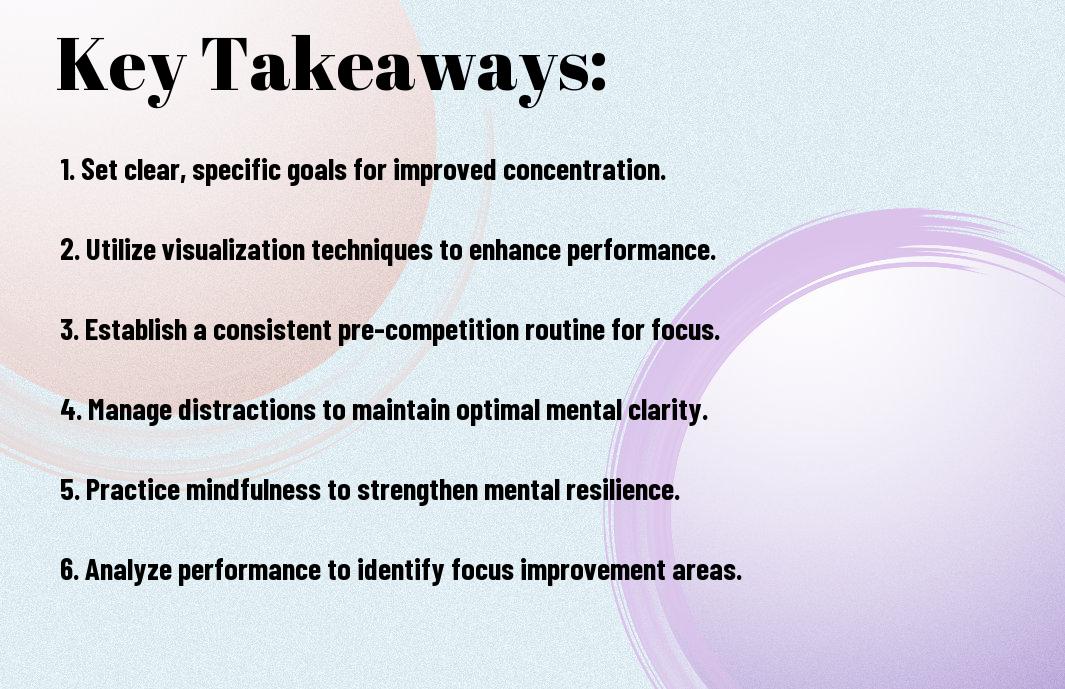You can elevate your performance in sports by enhancing your focus and concentration. Whether you’re an amateur or a seasoned athlete, honing your mental skills is just as important as physical training. This guide will provide you with actionable strategies to sharpen your attention, block distractions, and boost your overall game. By incorporating these techniques into your routine, you’ll find yourself more present during practices and competitions, leading to improved results and enjoyment in your sport.

Key Takeaways:
- Mindfulness Practice: Incorporating mindfulness techniques can enhance focus by training the mind to stay present during activities.
- Goal Setting: Establishing clear, attainable goals helps athletes maintain concentration on specific tasks and objectives.
- Routine Development: Creating pre-performance routines fosters a sense of consistency and reduces distractions, allowing for improved focus.
- Physical Readiness: Ensuring proper physical conditioning minimizes fatigue, which can significantly impact concentration levels in sports.
- Environment Control: Minimizing distractions in the training and competition environment can greatly increase an athlete’s ability to concentrate.
Understanding Focus and Concentration
The ability to maintain focus and concentration is vital for athletes seeking peak performance. These mental skills allow you to direct your attention toward specific tasks, enhance your decision-making, and prevent distractions during competitions. By understanding the intricacies of focus and concentration, you can develop strategies to refine these abilities, improving your overall athletic performance.
Definition of Focus in Sports
An athlete’s focus refers to the concentration of mental energy on the task at hand, including the execution of skills, strategies, and situational awareness. It involves filtering out distractions and honing in on what is necessary for success in your sport, whether that be a play, a movement, or an opponent’s actions.
Importance of Concentration for Athletes
An athlete’s concentration significantly influences performance outcomes. When you concentrate effectively, you can absorb information quickly, respond accurately, and maintain your composure in high-pressure situations. This mental clarity allows you to execute strategies with precision and adapt to evolving circumstances during the game or event.
This heightened concentration minimizes the impact of external distractions and internal doubts, creating a mental environment conducive to peak performance. By enhancing your ability to concentrate, you increase your chances of achieving your goals, whether in practice or competition. Ultimately, it allows you to remain present, focusing on each moment as it unfolds, vital for attaining success in your chosen sport.

Key Factors Affecting Focus and Concentration
There’s a variety of elements that can significantly influence your focus and concentration in sports. Understanding these key factors is imperative for optimizing your performance:
- Environmental distractions
- Mental state and attitude
- Physical preparedness
- Nutrition and hydration
- Quality of rest and recovery
This knowledge will empower you to create strategies that enhance your athletic focus.
Mental State and Attitude
On a day-to-day basis, your mental state and attitude play a vital role in determining your ability to concentrate. A positive mindset promotes resilience and helps you remain focused on your goals. By cultivating an attitude of determination and confidence, you set the stage for better performance and improved concentration during training and competitions.
Physical Preparedness
Assuming you are physically well-prepared, your body will be able to perform optimally and maintain focus for extended periods. Physical readiness is directly linked to your overall concentration, as fatigue or physical discomfort can become significant distractions during your activity.
Concentration relies heavily on your physical condition. Engaging in regular training, maintaining a balanced diet, and ensuring you have enough sleep are all vital to building a solid foundation for optimal performance. When your body is healthy and strong, your mind can better maintain focus on the task at hand, making it easier for you to execute your skills effectively during competition.
How-to Tips for Improving Focus
Your ability to maintain focus during sports can be significantly enhanced with practice. Consider implementing the following strategies:
- Set clear goals for training and performance.
- Minimize distractions by creating a focused environment.
- Practice mindfulness techniques to anchor your attention.
- Incorporate regular breaks to refresh your mind.
- Seek feedback to help refine your focus strategies.
Perceiving progress in your concentration can empower your athletic performance.
Establishing a Pre-Performance Routine
How to create a pre-performance routine involves developing a series of consistent actions before each event. This routine can include warming up, mental rehearsals, and positive affirmations. By engaging in these familiar tasks, you signal to your brain that it is time to focus, which can enhance your overall mental preparation for the competition.
Utilizing Visualization Techniques
One effective way to improve focus is by utilizing visualization techniques. Visualizing successful performances can not only enhance your confidence but also help you mentally prepare for various scenarios you may face during the event.
For instance, before a game, you might visualize yourself executing skills successfully, such as making a perfect shot or executing a flawless movement. Engaging all your senses during this process can make the experience more vivid. This practice not only deepens your mental preparation but also conditions your mind for success, ultimately leading to better focus during actual performance.
Strategies for Enhancing Concentration During Training
To enhance your focus during training sessions, implement targeted strategies that shape your environment and mindset. Start by establishing routines that signal to your brain that it’s time to concentrate. Incorporate techniques such as mindfulness and visualizations to keep your attention on the task at hand. Practicing these strategies consistently can lead to significant improvements in your performance.
Setting Clear Goals
An important aspect of improving concentration is setting clear and achievable goals. By defining what you want to accomplish in each training session, you create a roadmap that directs your focus. This clarity allows you to channel your energy efficiently and provides motivation, making it easier to sustain your concentration over longer periods.
Limiting Distractions
The ability to limit distractions is fundamental to improving your concentration. By creating an environment conducive to focus, you can minimize interruptions that may derail your training. Consider aspects such as noise levels, visual clutter, and even the presence of your electronic devices when planning your training setup.
Understanding that distractions can stem from both your environment and your habits is key. Evaluate your training space to identify possible disruptions, like unnecessary equipment or excessive noise. Additionally, be mindful of your technology use. Turning off notifications or placing your phone in another room can greatly enhance your ability to concentrate. Creating a focused environment will facilitate better training outcomes and boost your overall performance.
Mindfulness and Its Role in Sports Focus
Many athletes experience distractions that hinder their performance. By incorporating mindfulness into your training, you can sharpen your focus and enhance your concentration on the task at hand. Mindfulness encourages you to become fully present during practice and competition, allowing you to tune out distractions and improve your overall performance. This mental clarity is vital, as it enables you to react quickly and make better decisions in high-pressure situations.
Incorporating Mindfulness Practices
On your journey to improve focus, consider integrating mindfulness practices into your routine. Techniques like breath awareness, body scanning, and visualization can help you heighten your awareness and cultivate a strong mental state. By setting aside time each day to practice these methods, you can gradually strengthen your ability to concentrate during games and training sessions.
Benefits of Meditation for Athletes
Incorporating meditation into your regimen can have significant benefits for your athletic performance. Regular meditation practice helps to reduce stress and anxiety, allowing you to maintain a calm and focused mindset. This improved mental state enhances your self-awareness, enabling better decision-making during competitions.
For instance, athletes who meditate often report increased resilience to pressure and a heightened ability to refocus after setbacks. This mental agility enables you to adapt to challenging situations in real-time, enhancing your performance significantly. Additionally, consistent meditation can improve your overall well-being and sleep quality, contributing to optimal athletic performance on all fronts.
Nutritional Factors Impacting Focus
All athletes know that nutrition plays a significant role in performance and mental clarity. Fueling your body with the right foods can enhance your focus and concentration during training and competition. Consider incorporating the following factors into your diet:
- Complex carbohydrates for sustained energy
- Omega-3 fatty acids for improved cognitive function
- Antioxidants to combat oxidative stress
- Vitamins and minerals that support brain health
This approach can be complemented by exploring 10 tips to improving game concentration.
Foods That Boost Brain Function
One way to enhance your focus is by consuming foods known for their brain-boosting properties. Ingredients such as leafy greens, walnuts, berries, and dark chocolate can significantly improve cognitive function. Including these in your diet will support your mental agility, ultimately benefiting your performance on the field.
Hydration and Performance
Boost your focus and concentration by paying attention to your hydration levels. Dehydration can cause fatigue and diminish cognitive abilities, which can impede your performance in sports. Ensuring you drink enough water throughout the day will keep your mind sharp and your body ready to compete.
It is crucial to monitor your hydration, especially during intense training or competitive situations. Dehydration can reduce blood flow to the brain, impeding performance and making it harder to concentrate. Aim to drink water before, during, and after exercise, along with electrolyte-rich beverages when needed to replenish lost minerals. Adequate hydration not only supports your physical performance but also your mental sharpness, helping you maintain focus and consistency in your game.
Summing up
Summing up, improving your focus and concentration in sports involves several strategies that you can integrate into your routine. Practice mindfulness and visualization techniques to enhance your mental clarity. Set specific, achievable goals to maintain motivation, and establish a consistent pre-performance routine to eliminate distractions. Additionally, prioritize physical fitness, as a well-conditioned body supports mental acuity. By implementing these practices, you can enhance your performance and achieve greater success in your sport.
Q: What are some practical techniques to enhance focus during sports training?
A: To enhance focus during sports training, athletes can try several practical techniques. Firstly, setting clear and specific goals for each training session helps to create a roadmap and keeps the mind engaged. Incorporating mindfulness practices, such as meditation or deep breathing exercises, can also assist in enhancing concentration by calming the mind and reducing distractions. Visualization techniques, where athletes picture themselves performing successfully, can further develop mental clarity and focus on the task at hand. Lastly, minimizing distractions in the training environment, such as turning off mobile devices or choosing a quiet location, can create a better space for concentration.
Q: How can nutrition affect focus and concentration in athletes?
A: Nutrition plays a significant role in an athlete’s ability to concentrate and maintain focus. A balanced diet rich in whole grains, lean proteins, fruits, and vegetables provides the necessary nutrients that support brain function. Foods high in omega-3 fatty acids, such as fish, can improve cognitive function, while complex carbohydrates, like oatmeal and brown rice, provide sustained energy for prolonged concentration. Staying well-hydrated is equally important, as even mild dehydration can impair cognitive abilities. Athletes may also consider timing their meals appropriately; consuming small, balanced snacks before and during training can help maintain energy levels and focus throughout the session.
Q: What mental strategies can athletes use to deal with distractions during competitions?
A: Athletes can use various mental strategies to manage distractions during competitions effectively. One common technique is developing a pre-performance routine that includes specific warm-ups, mental rehearsals, and breathing exercises. This routine can create a sense of familiarity and focus, allowing athletes to block out distractions. Employing positive self-talk can also help by reinforcing confidence and directing focus away from external noise. Additionally, creating a ‘focus trigger’—a specific word, phrase, or visualization that reminds the athlete to concentrate—can prove beneficial when distractions arise. Finally, engaging in regular mental training exercises, such as practicing concentration drills, can increase resilience against potential distractions during important competitions.


